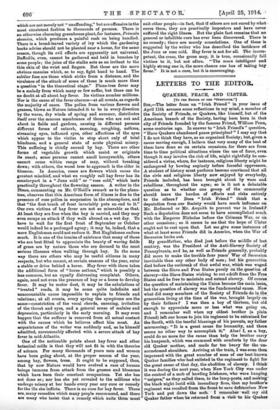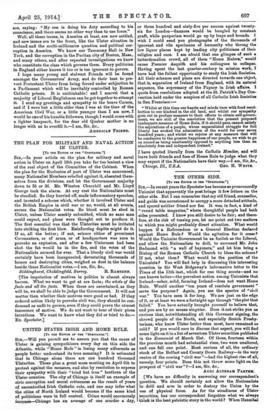LETTERS TO THE EDITOR.
QUAKERS, PEACE, AND ULSTER.
[To ram Emus or Tea "Sracwroa."1
Sra,—The letter from an "Irish Friend" in your issue of April 11th arouses some reflections in my mind, a member of the Society of Friends, or Quakers, like himself, but of the American branch of the Society, having been born in that city of Friends founded by the famous Friend, William Penn, some centuries ago. In answer to "Irish Friend's" question, "Have Quakers abandoned peace principles?" I may say that I do not think they have, as an organized Society; but, given a cause moving enough, I believe that very many of the best of them have done so on certain occasions, for there are from time to time political situations where the use of force, even though it may involve the risk of life, might rightfully be con- sidered a virtue, where, for instance, religious liberty might be endangered by bowing supinely before forceful oppressors. A. student of history must perforce become convinced that all the civic and religions liberty now enjoyed by everybody, Friends included, has been brought about by wars and rebellions; throughout the ages; so is it not a debatable question as to whether one group of the community should leave the burden of efforts and risks entirely , to the others ? Does "Irish Friend" think that a• deputation from our Society would have much influence on Mr. Redmond or Mr. Asquith to prevent war in Ireland? Such a deputation does not seem to have accomplished much with the Emperor Nicholas before the Crimean War, or on other occasions ; so it seems to me that the hope of Ulster ought not to rest upon that. Let me give some instances of what at least some Friends did in America, when the War of Secession broke out.
My grandfather, who died just before the middle of last century, was the President of the Anti-Slavery Society of Pennsylvania, and he, as well as Friends generally, probably did more to make the terrible four years War of Secession inevitable than any other body of men; but his generation died before the outbreak of that awful war, which wee waged between the Slave and Free States purely on the question of slavery—the Slave States wishing to cut adrift from the Free States and be free to maintain and extend slavery. Of courte. the question of maintaining the Union became the main issue,, but the question of slavery was the fundamental cause. Now what did many members of the Society of Friends do in the generation living at the time of the war, brought largely on by their fathers P I was then a boy of thirteen, but old enough to appreciate more or less what was going on, and I remember well when my oldest brother (a plain Friend) left our house to join his regiment to be entrained for the South, with the tearful blessings of his parents, my father murmuring: "It is a great cause for humanity, and there seems no other way to accomplish it." Alas I I, as a boy, could do no more for the cause than help the brother carry his knapsack, which was crammed with comforts by the dear old Quaker mother, and made far too heavy for the un- accustomed shoulders. Arriving at the train, I was even then impressed with the great number of sons of our beet-known Quaker families who-had enlisted in the regiment to fight for the great cause of that day, the-abolition of slavery. I think- it was during the next year, when New York City was under the control of a mob of bowling Irishmen, who were hanging "naigers," as they called them, to the lamp-posts, and making' the black night lurid with incendiary fires, that my brother's regiment was reca}led'from the front to save defeirceless New York and put down the mob. • I remember well my old Quaker father when•he returned- from a visit'-to his Quaker
son, saying: "My son is doing his duty according to his conscience, and there seems no other way than to use force."
Well, all these issues, in America at least, are now settled, and new issues are to the front, like the Ulster situation in Ireland and the multi-millionaire question and political cor- ruption in America. We know our Tammany Hall in New York, and the corruption in the Puritan city of Boston, Mass., and many others, and after repeated investigations we know who constitute the class which governs them. Every politician in England either knows it too or is too ignorant to govern.
I hope many young and stalwart Friends will be found amongst the Covenanters' Army, and do their best to pre- vent Protestant Ulster from being forced under subjection to a Parliament which will be inevitably controlled by Roman Catholic priests. It is unthinkable ! and I marvel that a majority of Liberal Englishmen can be got together to attempt it. I send my greetings and sympathy to the brave Carson, and if I were but a little older than I was at the time of the American Civil War, or a little younger than I am now, I would be one of his humble followers, though I would come with a lighter knapsack, for the dear old Quaker mother is no longer with us to overfill it.—I am, Sir, &c.,
AMERICAN FRIEND.



























































 Previous page
Previous page